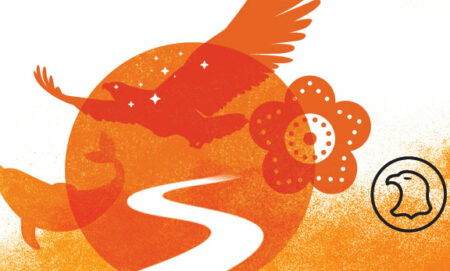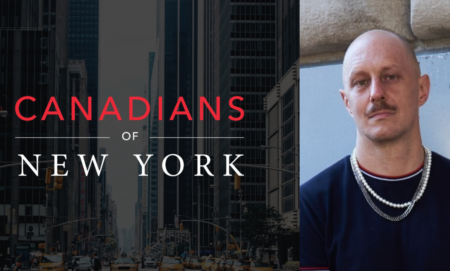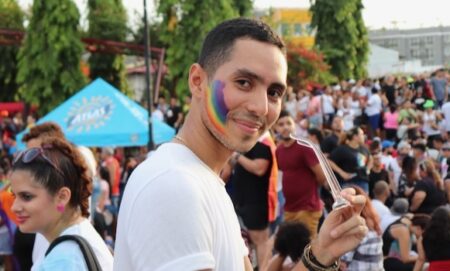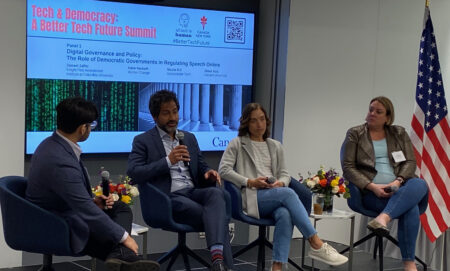This year marks the 100th anniversary of the Toronto Symphony Orchestra (TSO). On February 13, it makes its return to Carnegie Hall under the direction of Mark Williams, the first Black man to lead a major North American orchestra. We are proud to support the event and are grateful to Williams for finding time in his busy schedule to discuss his new life in Canada, his vision for the TSO, and what he loves about music. [Edited for length and clarity]
What drew you to classical music when you were young?
My career in classical music and my love for it started in the fourth grade, when I received my permission slip to study an instrument. I went to public school in Cincinnati, Ohio, and I’m just old enough that it was the norm for students to have access to instruments in school.
I studied the clarinet for many years before switching to the French horn and I eventually decided that indeed music was the career that I wanted. I went on to study at the Cleveland Institute of Music.
Who have been your role models as you navigated your career?
I really believe in mentorship because I know very clearly that I wouldn’t be in my current position in my career had I not been mentored myself. I think of bosses I had at IMG Artists, the San Francisco Symphony and the Cleveland Orchestra and all the places I’ve worked. I’ve had the good fortune to work for people who saw me – for what I could do, who believed in me, counselled me, corrected me.
Sometimes it was really great and sometimes it didn’t feel so great. But ultimately it all came from a place of knowing that I brought value to the institution and that I could do more in my career. There are so many people who I would look to as mentors who helped me along the way. These are people who I still call – they know me and my story and they can always give me a really good perspective on the challenges that I’m facing today.
There are so many ways we knowingly or unknowingly become mentors and role models.
There are also artists who have been great mentors to me. While I don’t create music myself, the primary purpose of every role I’ve had is to support great artists making great music on the biggest stages in the world. So having a relationship with artists and hearing honestly from them about the work that I do has been hugely useful for me.
I think about the inspiration that so many of those artists have given me. When I was a kid I opened a recording of opera’s greatest moments and saw the face of Jessye Norman staring back at me. I didn’t know who she was, but I remember in that moment thinking if she was able to do this, maybe I could. There are so many ways we knowingly or unknowingly become mentors and role models.
You came to the TSO after almost a decade leading the Cleveland Orchestra. What’s been the biggest surprise about life in Toronto?
The culture is so incredibly different. That’s not something you notice when you visit because coming from the U.S. it feels very similar. But once you’re working here, you’ll see that the culture is far more collaborative. There’s a goal of finding consensus – of making an effort to bring everyone in on a decision or direction that I didn’t find in the U.S.
Torontonians and to the extent that I can paint with a very large brush – Canadians – are so proud of their country and of this orchestra. People have been incredibly generous in welcoming me, my husband and my family and helping us build a network. I have a stronger and bigger network after 10 months here than I ever could have imagined. To me that’s Toronto and that’s Canada.
We often hear that Canadians are more indirect. Is that your experience?
There’s some truth in that. These are incredibly broad brushes that I’m using, but I would say that Americans are more direct. Canadians will tell you the same thing but it’s in subtext or not always emphasized the same way. I have to listen very carefully.
I’m a musician by training and I’m in an organization that creates music. Listening is an important part of making music. I think that I’m a good listener and that has served me well here.
What would you want Americans to know about the Canada’s music and cultural scene?
I would want them to appreciate the depth of the cultural scene and the cultural output of this country. I’m not sure that the diversity of the arts scene and of Toronto has dropped in the States. That’s why I’m thrilled to bring to Carnegie Hall Symphony No. 2, by Samy Moussa, which is a new piece we commissioned from a Canadian composer. In so many ways that’s representative of the depth here. Our performance can shine a light on what really happens in Canada. I would hate to see Canadian culture reduced to a few tropes because that’s not what it is.
People have been incredibly generous in welcoming my husband and my family and I and helping us build a network.
What is the orchestra doing to break down barriers and attract a new generation of classical music lovers?
One thing is being more present and visible to create more opportunities for people to engage with us and vice-versa. We started our season with a free open house. People could learn how to read and write music. And we had performances from people of a variety of cultural backgrounds, all of which are reflected in Toronto. We had a free concert featuring works we’d commissioned from Indigenous composers, from Persian-Canadian and Mexican-Canadian composers alongside the classics.
It’s important for people to see the depth of what we do. It’s not just Beethoven and Brahms. We love their work and we do it better than almost anyone and we’re going to continue to do that. But it’s not the only thing we do. In April we’re taking the Orchestra to the Rose Theatre in Brampton, Ontario, for a reggae roots program that was developed by Daniel Bartholomew-Poyser, who’s our Education Conductor and Community Ambassador.
We’re trying to be more visible and vocal about what we do. My hope would be that we come to a point where if you live in the greater Toronto area and you love music, you know that the TSO is a place for you.
Looking ahead to the TSO’s next 100 years, what do you think the audience will look like? What are they listening to?
I hope that the demographics of the audience will be the same as those of Toronto. When those two align, then we’ll know that we are truly Toronto’s symphony orchestra.
I think audiences will be listening to everything, because technology has so democratized music. It’s so easy to access and the barriers to experience it are so low. The divides between genres are also becoming more porous. I think we’ll meet fewer people – especially young people – who say “I don’t like that kind of music.”
I’m a classically trained French horn player. I love Beethoven and Brahms and Mahler and Bruckner. I love experimental classical music. But I also love reggae and I’m thrilled that I got tickets to see Beyoncé.
I hope that in 100 years the repertoire of the TSO will have expanded to include pieces that we’ve commissioned that have become classics in their own right, and that the orchestra continues to reinvent itself to connect with the audience.
What’s in your headphones to decompress after a stressful day?
That’s a tough question. One of the great parts of working for an orchestra is that there’s live classical music behind almost every door. I’m so connected to the live experience of orchestral music that I rarely listen to it in my free time. If I were decompressing, I’d probably listen to solo piano – Brahms Intermezzi, or early music such as the Monteverdi vespers. Or I might go in a completely different direction. Sometimes as professionals we need to be the absolute opposite side of ourselves, so I might lose the suit and tie and put on some Bob Marley.
My hope would be that we come to a point where if you live in the greater Toronto area and you love Music, you know that the TSO is a place for you.
What do you love about music?
I love the way that it brings people together. I love that moment in the concert hall when you realize that you haven’t been breathing for 10 minutes and that other people are having that same experience. It bypasses our intellectual selves: whatever our education, political views or religious beliefs – they all suddenly don’t matter because we’re experiencing the music at the same time.
I love that music – like scent – can recall memory and feelings. There’s music that we hear that I would say is nostalgic for a time that maybe never even happened. I can’t explain to you how the chords work to make that happen for us to have that feeling. But music gives us the opportunity to feel things we’ve never felt before. I can’t think of any other art form that does that. It’s the greatest honor of my life to support this art form.
Purchase tickets to the concert here.
For more information about the Toronto Symphony Orchestra, visit tso.ca, kathrynkingmedia.com, and call 917-751-8228.





